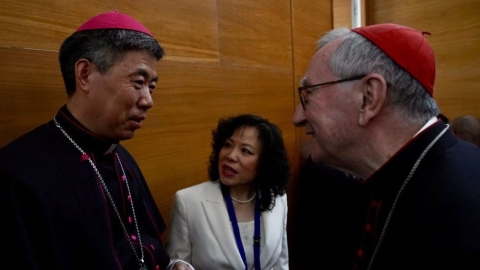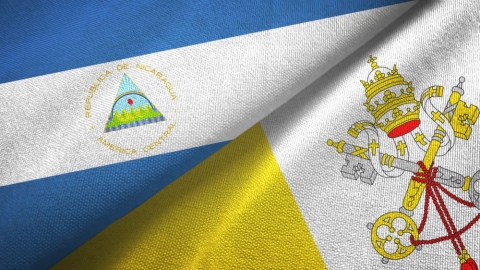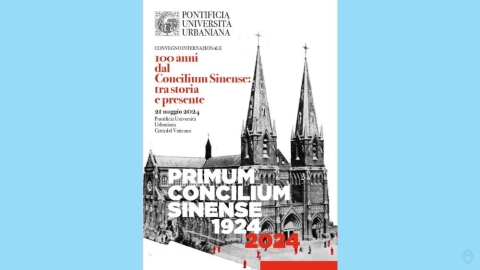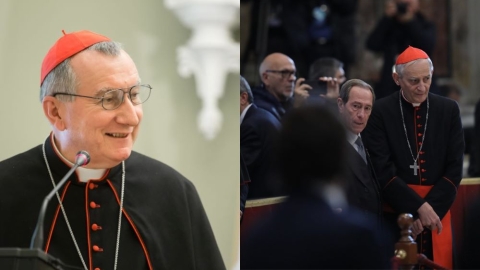Germany: Reactions to the Declaration of the DDF

After the Dicastery for the Doctrine of Faith (DDF) released its publication authorizing the blessing of couples in irregular situations—unmarried or same-sex couples—the reactions of Germany, the spearhead (along with Dutch-speaking Belgium) of the movement promoting these blessings, are diverse, but already demonstrate the gravity of the damage.
As was to be expected, the reactions where on the whole very positive, even enthusiastic—with, however, some grumbling from those who had wanted a pure and simple recognition of same-sex unions. Some conservative voices lament it, such as the conservative movement Maria 1.0, which points out the inconsistencies in the text.
Satisfied Reactions
Some bishops, such as Heinrich Timmerevers, Bishop of Dresden-Meißen, express their joy and their surprise: “This has never before been done in the history of the Church; it’s an important step that the Pope now makes possible,” he told ARD (a German broadcasting channel).
The newly appointed Archbishop of Bamberg, Herwig Gössl, also welcomed Rome’s decision. It takes up “an important wish of many of the faithful, which was also expressed by the Synodal Path,” he stated. He emphasizes, however, that the Roman Declaration reserves marriage for a man and a woman.
The Bishop of Mainz, Peter Kohlgraf, appreciated the Vatican publication. “I am very happy that this text may, I hope, put an end to certain aggressive rejections and that it will be clear that the attention given to people through blessing is truly Catholic,” he wrote on Facebook.
Msgr. Michael Gerber, Bishop of Fulda, showed his gratitude: “Homosexuals thus receive an important gesture: what you have to offer is important and valued; we enrich each other.” Bishop Gerber sees in the teaching of the Church a real development, which is important for the lives of many people.
Cardinal Reinhard Marx, Archbishop of Munich and Freising, said he was surprised by the Vatican’s Declaration: “I did not think that such a signal would arrive so quickly.” He sees it as a first step which may seem small for German Catholics, “but in the universal Church, this possibility is enormous.”
The cardinal added that each culture must now develop its own rules of application: “For us, this is nothing new. We are already working on it.” Guidelines are already in the process of being developed and will be made available to pastoral agents.
As for Bishop Georg Bätzing, President of the German Bishops’ Conference (DBK), he published a statement on the DBK website in which he opposes blessing and sacramental marriage, which is reductive compared to the Declaration. He sees, above all, that the text affirms that “the established framework is sufficiently clear to give ordained ministers the necessary security of action.”
Related Article:
Mixed Reactions
The Bishop of Würzburg, Franz Jung, reacted with reserve: “Acts of blessing are considered as an aid for a better life, to live the values of the Gospel with greater fidelity,” he wrote. “We must see if these acts of blessing serve to attain this objective in the framework defined by the declaration,” he added. He sees in the Declaration an attempt to perform a balancing act between the demands of pastoral practice and the official teaching of the Church.
In a joint statement, two Catholic women’s associations described the Declaration as “not long-awaited.” But for both associations, it is incomprehensible that blessings could not be performed within the framework of religious services.
The pro-LGBT German initiative #OutInChurch reacted with skepticism: “As long as we talk of irregular relationships and blessings remaining forbidden in religious services, jubilation will be very limited.”
The Catholic LGBT+ Committee expressed a similar opinion. In a statement, the committee criticized the fact that the DDF’s Declaration maintains the current teaching of the Church on marriage. The magisterium continues to speak of irregular situations concerning relations between queer persons. The blessing now possible would be a “light blessing.”
Dismayed Reactions
This is particularly the case of the Maria 1.0 association, which analyzes the text, pointing out its inconsistencies. The authors describe “a theologically very ambivalent and ambiguous document” and explain that evil can never be an object of blessing. They add that it is a novelty in the history of the Church.
And they explain that: “Many have the impression that the Church no longer considers same-sex relationships and other irregular situations immoral and that it blesses them. This would be the worst possible reading.” They describe the disorder that is already being created in Germany, which received the Declaration eagerly.
The “New Departure” association, which is strongly opposed to the Synodal Path, tries another route: in a statement, it seeks to show that Fiducia supplicans does not break with Church doctrine and highlights the limitations expressed in the Declaration. –Reading this text, it is painful to watch the authors sink into an impasse.
Conclusion
The reactions in Germany, whose Synodal Path is at the forefront of promoting blessings for same-sex couples, are hardly surprising. The Church in Germany takes what it is given and now will make it bear fruit: there will be almost no difference between liturgical blessing and non-liturgical blessing. The “rituals” already approved in certain dioceses will continue to be used.
The disgruntled see the glass as half empty: they await the pure and simple recognition of same-sex “marriage” by the Church. The smartest people know that this is not necessary to move forward. Now, they have the law on their side. What bishop will now be able to forbid anything in this domain?
Some thought that this Declaration could pull the rug out from under the German synodal vanguard. This is an error: the text only pushes the German Church even further down the path of schism and heresy.
(Sources : katholisch.de/DBK/Maria 1.0/neuer Anfang – FSSPX.Actualités)
Illustration : Photo 256601981 © Wirestock | Dreamstime.com





